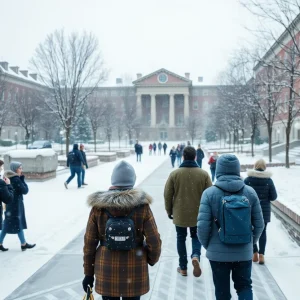Lexington, Kentucky Hosts Vigil Honoring Lives Lost in the Middle East
On October 7, over 100 attendees gathered outside the William T. Young Library at the University of Kentucky for a vigil titled “A Vigil for One Year of Genocide”. Organized by the on-campus Coalition for Palestine, the event aimed to honor those who have lost their lives during the ongoing humanitarian crisis in the Middle East.
The gathering was attended by students and community members, along with 15 officers from the UK Police Department for security. The vigil featured a large piece of paper adorned with thousands of hand-drawn poppies, along with posters bearing the images of victims and phrases that highlighted the severity of the situation. Additional symbols of remembrance included books, backpacks, flowers, and small candles.
S.A., a UK student who opened the vigil, reflected on the shocking nature of modern warfare, stating, “For the first time in history, we are watching a genocide being live streamed onto our phones.” She articulated the emotional weight of various personal items such as earrings and graduation gowns, connecting them to the lost lives in places like Gaza, Lebanon, Syria, and Yemen.
Another speaker, Ala Hassan, a recent graduate, drew parallels between the struggles in the Middle East and the execution of Marcellus Williams, highlighting the interconnectedness of fights for justice across different regions. “Our liberation is interconnected,” she emphasized to the audience. This sentiment was reinforced through poetry, as Hassan recited “The Perplexing Smiles of the Children of Palestine,” encouraging attendees to chant along.
Hannah I., a dental school student, underscored the human cost of the conflict by sharing alarming statistics from Gaza. “Every hour, 15 people are killed, and 42 bombs are dropped,” she reported, urging listeners to disseminate this information widely.
Layla A. spoke about the resilience of Palestinian people, drawing on her mother’s experiences under occupation. She emphasized the importance of poetry as a means of voicing the struggles faced by the silenced, reciting the poem “If I Must Die” by Palestinian writer Refaat Alareer, followed by a moment of silence for reflection.
The final speaker, Logan, connected the plight of Palestinians to that of oppressed communities in the United States, specifically in Appalachia. He critiqued the U.S. government’s spending priorities, calling for investment in public services rather than military aid to foreign nations.
Logan concluded the vigil with calls to action, listing demands that aim to sever academic ties with Israeli institutions and to advocate for a ceasefire. The Coalition for Palestine encouraged attendees to join ongoing efforts and initiatives to promote awareness and action related to the ongoing crisis.
This solemn and reflective event served as a reminder of the unresolved conflicts and highlighted the importance of continued advocacy for those who have been affected by these crises.

























